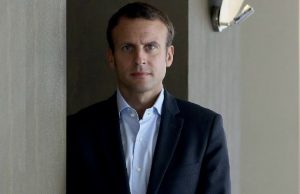Emmanuel Macron: Perfect Timing

Emmanuel Macron
The fate of the European Union may well rest on his shoulders. Front-runner in the French election campaign, Emmanuel Macron (39) is widely expected – but not guaranteed – to trash Marine Le Pen in the May 7 run-off for the presidency by a two-to-one margin. A liberal-centrist, youthful, and with plenty of flair though never before elected to pubic office, Mr Macron came out of nowhere to claim the top spot. A former minister of Economic and Industrial Affairs, the candidate promises reform without upheaval.
Mr Macron was the main beneficiary of the sudden fall from grace of conservative front-runner François Fillon who was found to have parachuted his wife into a non-existent yet well-paying job at the expense of the taxpayer. Though he refused to quit the electoral race, Mr Fillon’s popularity plummeted in the wake of the scandal dished up by the satirical weekly Le Canard Enchainé.
As the candidate to beat, Emmanuel Macron has become the main target for negative campaigning and already had to vehemently deny a gay extramarital affair. Wikipedia founder Julian Assange, still holed up in the Ecuadorian embassy in London, has promised additional revelations that may embarrass Mr Macron.
Though he has so far provided few details on his policy platform, Mr Macron did appeal for an immediate strengthening of the euro – which he called “a weak D-mark” – and a reform of the Eurozone in order to assure the common currency’s survival: “Without this, the euro will be gone in under two years.” In a speech at Humboldt University in Berlin, Mr Macron emphasised the need for action. “The truth is that we must collectively recognise that the euro is incomplete and cannot last without major reforms. It has not provided Europe with full international sovereignty against the dollar on its rules. It has not provided Europe with a natural convergence between the different member states.”
Mr Macron also stressed the need for France to reform its rigid labour market, and appealed to Germany to end its austerity fetish and start investing for its own benefit and that of Europe, adding that the “dysfunctional” euro has been a boon to German exporters. Interestingly, Mr Macron proposes the creation of a Eurozone budget to finance investments – in lieu of quantitative easing – and help struggling member states such as Greece.
On the campaign trail, Mr Macron steadfastly refuses to endorse anti-EU sentiments, preferring to remind his audience instead that the union has brought both wealth ad stability to the continent: “We need more integration, rather than less, but it must be accomplished without sacrificing sensible solutions to relatively simple problems.”
To elaborate a comprehensive policy platform, Mr Macron invited almost 400 experts to help put together a manifesto, defining ten priorities, each with a specific and detailed proposal attached. In his best-selling book – Révolution – launched last December just before the start of the election season, Mr Macron describes himself as a left-leaning no-nonsense liberal. He wants to streamline France’s overblown bureaucracy, reduce the weight of regulation, and simplify the country’s tax system, amongst others.
The En Marche! (mind the initials) movement he founded for the occasion has deftly claimed the political centre ground vacated by both Marine Le Pen and the now disgraced François Fillon. Thus, Emmanuel Macron may easily become the candidate to block Ms Le Pen’s ascendancy to the French presidency. In keeping with French political tradition, voters in the first round select their favourite candidate while in the second round the most-hated contender is summarily rejected.
A victory for anyone but Marine Le Pen will constitute a salvation – of sorts – for the grand European project, under siege by both Brexit and President Trump. Staunchly pro-European whilst also committed to reform, Emmanuel Macron may well turn out to be the right man in the right job at the right time.
You may have an interest in also reading…
European Commission Confirms Billions Lost in VAT Gap
An estimated €193 billion in VAT revenues (1.5% of GDP) was lost due to non-compliance or non-collection in 2011, according
President of Montenegro Milo Đukanović: Visions of Europe by Its Best Pupil
Last September, the European Union launched its own Belt and Road Initiative, connecting Europe with Asia. The announcement of Brussels’
Precision Medicine and Gender Disparities: Research Promotes Major Advances in Brain Health
In the ever-evolving world of healthcare, precision medicine has taken centre stage — and for good reason… Precision medicine can


















































































